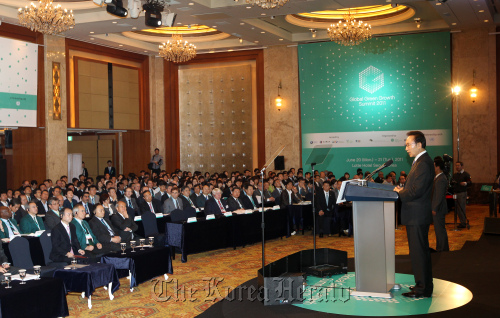Participants share promoting green growth as a fresh driver for future economyPoliticians, scholars and industry leaders Monday touted a global shift toward green growth and called for enhanced cooperation to tackle the environmental challenges facing mankind.
About 90 academics, businessmen and officials from 25 national governments and international institutions shared views at the first Global Green Growth Summit hosted by the Korean government and the Organization for Economic Cooperation and Development.
Among them were OECD Secretary-General Angel Gurria, the U.N. Economic and Social Commission for Asia and the Pacific chief Noeleen Heyzer, Danish Climate and Energy Minister Lykke Friis and chief of South Africa’s National Planning Commission Minister Trevor Manuel.

President Lee Myung-bak delivers a speech during the opening ceremony of the first Global Green Growth Summit conference, which kicked off on Monday at Lotte Hotel in downtown Seoul. (Yonhap News)
The list also includes Nicholas Stern, a London School of Economics professor; Masayoshi Son, chairman and chief executive of Japan’s Softbank Corp.; and Zhengrong Shi, chairman of Suntech Power Holdings, the world’s top solar panel producer.
The two-day event commemorates the OECD’s 50th anniversary and Korea’s 15 years of membership, plus the first anniversary of the Global Green Growth Institute, a think tank established by the Lee Myung-bak administration in May last year.
At the forum, participants were unanimous in promoting green growth as a fresh driver for future economy, while providing poor countries with sustainable growth engine.
“We’re looking at opportunities to drive growth,” Heyze said during a roundtable. “There are challenges for our generation, but also opportunities. Green growth is one of shifts we have to move toward.”
An active GGGI board member, Stern said the high-carbon growth path is a dead-end, which could result in severe consequences for all human beings.
“(Green growth) involves a new energy-industrial revolution full of creativity, innovation and growth,” he said. “We must look to rich countries to provide a stronger lead. Success will involve initiative and entrepreneurship from the local private sector to international collaboration.”
Many attendees including Stern praised the establishment of the GGGI, which was designed to promote green growth and help developing countries draw up their own strategy.
“Korea is a leader in green growth,” Gurria said. “Korea is the first country to adopt green growth as a long-term economic strategy. We may call President Lee ‘the father of green growth.’”
The Seoul-based think tank came as part of the government’s five-year plan, under which the country will invest 2 percent of gross domestic product annually into research and development on new green infrastructure.
In 2009, Lee declared an ambitious goal to cut the country’s greenhouse gas emissions by 30 percent below “business-as-usual” projections through 2020 under its low-carbon, green growth vision.
The voluntary target, announced on the sidelines of United Nations climate talks in Copenhagen in December that year, surprised many countries given that Korea had the fastest emissions growth rate among OECD countries.
Korea is the world’s ninth-largest polluter. Its growing economy has seen carbon dioxide emissions more than double over the last two decades.
According to Gurria, the country’s renewable energy industry has expanded six fold since the adoption of the eco-friendly policy, with private sector investment increasing at an annual rate of 74 percent.
In his opening remarks at the summit, Lee unveiled a plan to establish an international research organization named Green Technology Center, which will develop green technologies with leading research institutes at home and abroad, train personnel and share technological know-how with developing nations.
By Shin Hyon-hee (
heeshin@heraldcorp.com)

![[AtoZ into Korean mind] Humor in Korea: Navigating the line between what's funny and not](http://res.heraldm.com/phpwas/restmb_idxmake.php?idx=645&simg=/content/image/2024/04/22/20240422050642_0.jpg&u=)
![[Exclusive] Korean military set to ban iPhones over 'security' concerns](http://res.heraldm.com/phpwas/restmb_idxmake.php?idx=645&simg=/content/image/2024/04/23/20240423050599_0.jpg&u=20240423183955)



![[Graphic News] 77% of young Koreans still financially dependent](http://res.heraldm.com/phpwas/restmb_idxmake.php?idx=645&simg=/content/image/2024/04/22/20240422050762_0.gif&u=)